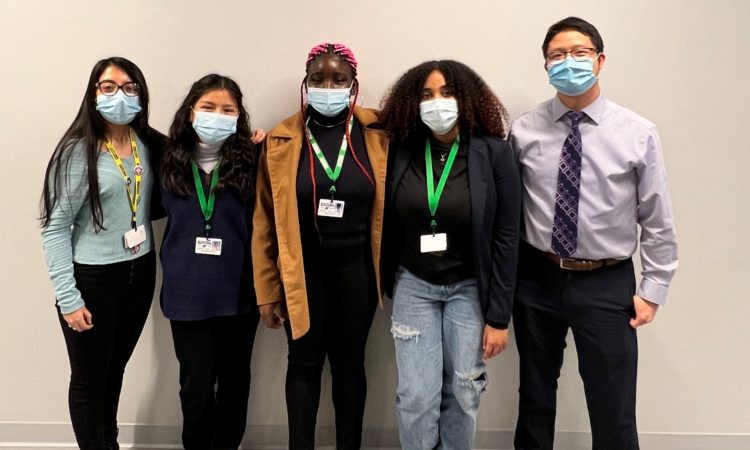
[December 2021] When students at KIPP Academy Lynn Collegiate realized that air pollution was a bigger problem in communities of color, they decided to do something about it. That something came in the form of Samsung Solve for Tomorrow, a STEM challenge that Samsung holds every year for public schools across the country. Students are asked to dream, develop, build, and test solutions to problems that exist within their own communities.
“This gives me an opportunity to be part of a voice to make a change. I feel like we could really do something, this generation,” 10th grade student Esther Agbedun says.
The team is made up of Flory Mendez Merida (10th), Iris Guzman De Leon (11th), Esther Agbedun (10th) and Lia Haile Mekonnen (10th), alongside faculty advisor Mr. Allen Wang.
Together, they drafted a proposal for an air quality monitor device that they can use in communities around Boston to help track air quality. Knowing the communities of color face this problem more than other communities, the team is set on helping users of the machine not only identify when there is poor air quality but also provide users tools to help improve the air quality.
“We’re going to check the air quality of POC communities near the Boston communities. A lot of those communities don’t know what the air quality is, even if they can breathe. We’re going to make a device to help people,” Lia says.
Their proposal led them to be named one of two state winners in Massachusetts, and now the team is headed to nationals!
“One of the things I think a lot about is that the engineering discipline is highly filled with male identifying individuals, and we have a high school team here where everyone identifies as female,” Mr. Wang says.
And he’s right. Statistically speaking, less than 25% of engineering jobs belong to women, but with education around STEM becoming more equitable and accessible, the number of women in STEM, especially women that identify as BIPOC, is on the rise.
The team has created a robust 6-week plan that will have their device made and functioning by February 2022 so it can be submitted for the national competition. Mr. Wang acknowledges how exciting the competition is, especially the potential for the $50,000 reward, but what is obvious about this team is that they are not doing it for the competition. They are doing it because they believe in the work and they want to make a difference in their community.
While the project is huge, these young women have yet to back down from the challenge. Right now, they are in the stage of drafting how the device will look, using materials they have in the classroom and knowledge they’ve gained over their time at KIPP Academy Lynn Collegiate in the engineering department.
“OnShape is a website we use where you are able to use tools to make a 3D object that can be printed. We have a design scheduled beforehand, and we’ll think of constraints and requirements needed for the project. It takes a lot of time, there’s a lot involved,” Iris says.
These young women have thought of everything, too. They want their device to be environmentally friendly, while also widely accessible.
“If it’s too expensive, not everyone can get it, and that’s sad but that does matter. It comes down to the availability of the devices, are they supplied and available to low-income communities. We have to think about that,” Flory says.
Congratulations to the team and the work they are doing!
To learn more about Samsung’s Solve for Tomorrow Challenge, visit their website.